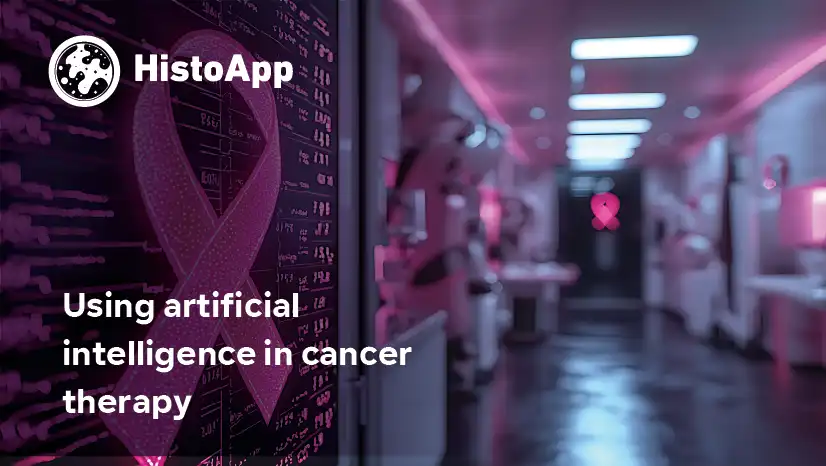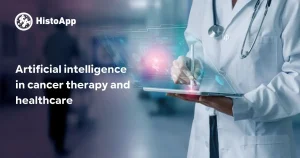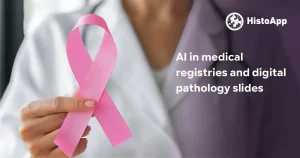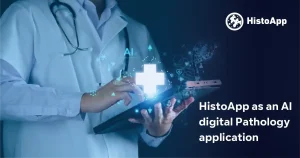


15 Jan 2025
Using artificial intelligence in healthcare has rapidly evolved and demonstrated potential in transforming biomedical cancer research by offering innovative solutions for cancer diagnosis, treatment, and patient care. Over the past two decades, Smart technology in healthcare has played a pivotal role in revolutionizing various facets of cancer clinical research, including radiodiagnosis, radiotherapy, chemotherapy, immunotherapy, targeted therapy, surgery, and nanotechnology.
Healthcare and Artificial intelligence have enabled early detection and precise characterization of cancer through advanced image analysis techniques. Smart technology in healthcare enhances the accuracy of medical imaging, facilitates precise tumour boundary delineation in radiotherapy, predicts patient responses in chemotherapy, selects ideal candidates for immunotherapy, identifies specific molecular targets for targeted therapy, and offers real-time support in surgery.
The synergy between Artificial Technology and nanotechnology promises the development of personalized nanomedicines for more efficient and targeted cancer treatments. Despite challenges related to data quality, interpretability, and ethical considerations, the future of AI in cancer research holds tremendous promise for improving patient outcomes through advanced and individualized care.
There is a wide range of using artificial intelligence in cancer therapy in our current and future lives, so let us look at the revolution coming our way.

Cancer stands as one of the foremost causes of fatalities worldwide. According to the World Health Organization (WHO) data from 2022, it is the second leading cause of death among noncommunicable diseases, claiming 9.3 million lives annually, second only to cardiovascular diseases (17.9 million), which makes using artificial intelligence in cancer therapy is highly demanded.
This significant impact has spurred extensive innovative efforts by academia and the pharmaceutical industry, leading to the development of new diagnostic and treatment technologies, including immunotherapy, the Internet of Things in healthcare and precision medicine.
Recently, there has been a growing interest in leveraging artificial intelligence (AI) and health information management and technology for the development of new diagnostics, treatments, and Internet of Things medical devices. AI encompasses a range of technologies such as deep learning, machine learning, healthcare and artificial intelligence, neural networks, and rule-based systems.
Stay tuned to our critical information about using artificial intelligence in cancer therapy.

With advancements in deep learning, healthcare and artificial intelligence have developed various AI applications that serve pathology such as HistoApp. Digital pathology through whole slide images (WSIs) has led to the development of AI for diagnostic tasks, particularly in cancer research. Studies have shown promising results in AI’s ability to detect breast cancer in lymph nodes and predict tumour origin in cases of cancer of unknown primary (CUP). AI has also been used to predict 5-year survival in colorectal cancer patients and mutation status across multiple tumour types.
Using artificial intelligence in cancer therapy is a pivotal subject to discuss and” IoT and Healthcare” is the talk of the hour.
Internet of Things (IoT) medical devices present new opportunities for healthcare professionals to remotely monitor patients and for patients to track their health. Wearable IoT of healthcare devices offer a range of benefits and challenges for both healthcare providers and patients.
For instance, they enable remote patient monitoring, which is a common application of Internet of Things Medical devices in healthcare. These devices can automatically gather health data such as heart rate, blood pressure, and temperature from patients who are not physically present in a healthcare facility, eliminating the need for in-person visits and manual data collection. They also facilitate heart rate monitoring for patients in healthcare facilities.
Unlike periodic checks, IoT and healthcare devices can track rapid fluctuations in heart rates, and they provide continuous monitoring without restricting the patient’s mobility. Additionally, many hospitals and healthcare facilities use IoT devices to remind individuals to sanitize their hands when entering hospital rooms. While these devices can’t physically sanitize hands, research indicates that they can significantly reduce infection rates by more than 60 per cent in hospitals.
Stay with us to read more about Using artificial intelligence in cancer therapy.

HistoApp is useful in the category of Using artificial intelligence in cancer therapy. HistoApp is a cutting-edge AI-driven digital pathology application designed to revolutionize the field of pathology by providing an accurate, efficient, and comprehensive analysis of histopathological images? It leverages advanced machine learning algorithms and deep learning models to assist pathologists in diagnosing diseases, identifying abnormalities, and generating detailed reports.
HistoApp represents a significant advancement in the field of digital pathology, leveraging the power of AI to support pathologists in their critical work. By enhancing diagnostic accuracy, increasing efficiency, and improving patient outcomes, HistoApp is poised to become an indispensable tool in modern healthcare.
We hope you enjoyed reading our article Artificial Intelligence in Cancer Therapy.
Artificial Intelligence in cancer therapy is the talk of the hour, so we suggest you read more about it.

- OR -
You can make us a free call through our website, press the button below and start the call
Call Us now